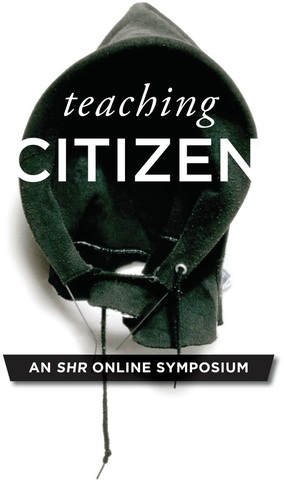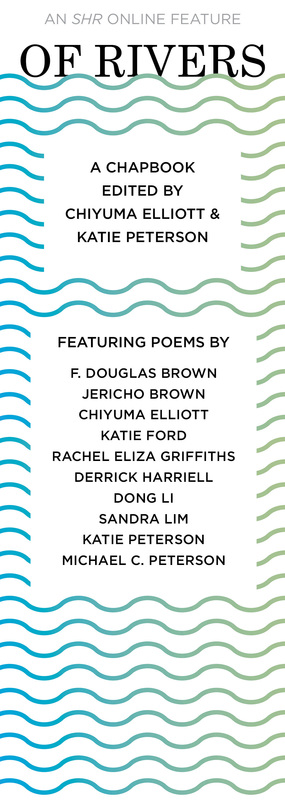|
Vertical Divider
When I accepted a visiting assistant professorship two years ago at a small liberal arts college in Kansas, I had the opportunity to pitch a new course of my choosing. Bethel College was founded by Mennonites, and the school retains its commitment to the Mennonite values of nonviolence, peacemaking, and social justice. This commitment extends to the curriculum. The college offers a certificate in Conflict Resolution; a minor in Peace, Justice, and Conflict Studies; and all students must take at least one PJCS-designated course as part of their general education requirements. Excited to develop a literature course for this segment of the curriculum and teach some of my most beloved texts, I put together a 200-level documentary poetry class entitled “Studies in Poetry: Archivists and Agitators,” a course I have now taught four times in the past two years and which has become a staple of the college’s PJCS offerings.
Citizen is one of the core texts of the class. Claudia Rankine’s book shares space on the syllabus with Muriel Rukeyser’s The Book of the Dead, James Agee and Walker Evans’s Let Us Now Praise Famous Men (not poetry, but an important touchstone and precursor for documentary poetics), Lorine Niedecker’s Lake Superior, C. D. Wright’s One Big Self: An Investigation, Tony Trigilio’s Historic Diary, and (in alternating semesters) Joseph Harrington’s Things Come On or Kaia Sand’s Remember to Wave. Because the class fulfills a general education requirement, it’s usually packed. And because it also counts as a literature elective, the room often fills with a diverse mix of students in terms of academic readiness, background in literature, comfort levels surrounding poetry and divergent thinking, and life experience. This makes for a highly charged and possibility-filled space for dialogue. Each semester, I devote slightly more than two weeks to Citizen—seven class periods. One class session is given to part II of the text; we watch clips of Serena Williams in the 2009 U. S. Open along with John McEnroe’s 1984 Stockholm “tennis tantrum,” paying special attention to the bodily affect of the referees. We also have a usually lively discussion about the commodification of black anger. When we attend to the scripts for situation videos (part VI onward), companion texts that bolster our discussions include news reports from a variety of sources regarding police brutality and police training, as well as the utterly insightful Judith Butler interview in the The New York Times, “What’s Wrong with ‘All Lives Matter’?” Two class periods are devoted to discussion of Tony Hoagland’s “The Change,” with in-class listening and response to Rankine’s and Hoagland’s well-known open letter exchange, available on the Academy of American Poets website. But our starting point and ongoing thread for discussing Citizen, and the approach I’ve found that most challenges my students, involves paying close attention to the workings of Rankine’s “you,” the second-person pronoun that gives so many of the book’s poems a distinct ethical charge. By attending to the shifting valences of this pronoun, students are often able to better articulate the uncomfortable electricity this book produces in them. In our discussions of the first few poems, students immediately recognize that the “you” seems to function as a kind of stand-in for a particular “I.” Why might a writer do this? I push them. What are the effects of this technique? Students wager a number of hypotheses: the writer might be choosing the pronoun because she doesn’t feel she can speak as an “I” for some reason; maybe she’s defensive or protected. As to the effect, students note that it makes the reader feel called to, but also like the reader is the “you”; in other words, the second-person pronoun offers readers a chance to feel the experience of the speaker as if it were their own—to try on the shoes of another and walk for a bit. Even students unfamiliar with poetry or the practice of close reading usually locate these deep operating principles of the book fairly quickly, and it’s a good place to start. When we turn our attention to the fifth poem in the book (“You are in the dark, in the car . . .”), students carefully tracking the “you” become productively confused. Wait. The “you” who listens to a colleague make a racist remark is not the same “you” who opens the third stanza/paragraph with “why do you feel comfortable saying this to me?” Suddenly, the reader must sit forward in full awareness of who she is, and of where her identifications and affiliations lie. These moments that require active discernment only increase in intensity and complexity as the book progresses. Are “you” the realtor who feels more comfortable with white clients, the African-American trying to buy the house, or the white friend who tags along to the showing and, perhaps unwittingly, accepts the benefits of white privilege? Are “you” the one who makes racist comments, suffers them, or realizes after the words have released themselves from your own mouth that you have made a misstep? Are “you” ever unsure while reading the book who exactly “you” are? Or have been? Or should be? Rankine’s poems do not allow the reader to look away. And it is precisely this alert and vulnerable quality—what Rankine, paraphrasing Judith Butler, calls the “openness [. . .] carried by our addressability”—that the second-person address seeks to lay bare in (and for) the reader. In a recent article in The Kenyon Review, Dan Beachy-Quick describes the practice of reading as “happening simultaneously in the author's mind and the reader's mind, with only the thin printed page as conduit between.” But the page, he argues “is no pure conduit: a word is an imperfect conductor, as given to insulating properties as to conductive ones.” Rankine’s “you” seems to wrestle itself out of this bind, functioning in Citizen as a kind of superconductor, tearing off the insulation of fixed identities and opening a channel for the energies of empathy. For undergraduates at a liberal arts college, still trying out various selves, many of them needing the broadening of perspective offered by this text, and most of them unfamiliar with what “active reading” might mean, I can think of no other book that might push them in their thinking and feeling more, because Citizen requires them to be so fully present. Some semesters, and with some students, the questions of address deepen into engaging conversations about apostrophe, the historical constructions of personhood and how this links to addressability, and Rankine’s complex negotiations throughout Citizen with the lyric “I.” But given that the teaching context is a general education class, I’m frankly happy when students are able to articulate how and why Rankine is using the pronoun and name its readerly effects. While the main assessment I link to this text is a final six-page paper that engages the topic of anger, I also assign a creative task that helps students understand the workings of Rankine’s “you” through employing the strategy themselves. For many, this is the first poem or creative writing they’ve ever attempted. I keep the assignment low-stakes in terms of its quantitative impact on their final grade, but this is often the most qualitatively valuable piece of writing they do. On the last day of the course, I open the floor for students to read some of the work they’ve produced over the semester, and students often choose to read this assignment. This creates a unique culmination to the course, where the “lessons in listening” that Citizen proffers are ones we enact in our own class community. Here is the creative assignment and three recent student examples. All three are autobiographical and speak to a variety of student experiences—police profiling, sexism in the church, and racism in college sports. I’m happy to say that the last piece, set on a college basketball court, did not happen at our institution.
I don’t think of Citizen as a text that I teach; the experience is more like a team-teaching effort between text and professor, and I am still figuring out how to hold up my end of the deal. One area that I know needs improvement is my developing a strategy for how to mine the silences that this text produces. Some silences are powerful and productive ones. This past semester, during one class period, an African-American student revealed that he and Travyon Martin used to play together when they were kids, and another student—on the heels of giving a presentation about the portion of the text dealing with the death of James Craig Anderson—told the class that she was his niece and then sat back down. What do you do in a moment like that? After we all sat stunned for a moment digesting this fact, I told the class that the feeling we were all having was more of a lesson than anything I could offer, and we all sat there in a vibrating silence, just breathing together, and taking it in.
But at times, I have looked out at my students and seen a silence that I am not sure how to read. I have sensed that I have not plumbed the breadth and depth of their responses. This past semester, on our last day of discussing the book, I asked my students to write down—anonymously—what they had not said about Citizen that they would have liked to say. What did I not make space for? What did you not say? What do you wish we had talked about? A number of students praised the book and our class conversations for opening their minds and increasing their awareness. And there was the rare note, like this one, that makes teaching seem entirely worth the effort: “This entire course has encouraged me to find beauty in the simplest things, and gain the courage to stand up for what I believe is right." But there were also a host of responses that pointed to a more unsettling kind of silence:
I am mindful that the next time I teach Citizen, I need to work harder to bring into the space of discussion these other electricities that charge the classroom but remain always a kind of unspoken static. Because if Citizen teaches us anything, it is that what happens in this country between human beings is ours, a shared burden to bear and to lift. As Rankine writes in part VII, “What happens to you doesn’t belong to you, only half concerns you. It’s not yours. Not yours only.”
|
|
CURRENT ISSUE
|
CONTACT
|
DEPARTMENT OF ENGLISH
|




